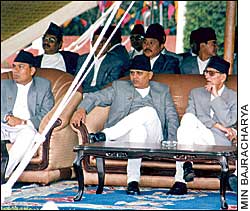 The struggle to save democracy is stuck in the stage of identifying who's shielding whom. From the trajectories of the sparks flying around, you would have thought the major targets were clear. But the volatility of political alliances has always diluted battle plans in Nepal. Consider the developments of the last three months. The seven partners of the budding broader democratic alliance were gearing up for their ultimate showdown with their shadowy foes. Their concentration on the cause was so compelling that they barely realised they had ditched a partner for trying to address the Open Theatre mass meeting in the only non-English foreign language Radio Nepal broadcasts in.
The struggle to save democracy is stuck in the stage of identifying who's shielding whom. From the trajectories of the sparks flying around, you would have thought the major targets were clear. But the volatility of political alliances has always diluted battle plans in Nepal. Consider the developments of the last three months. The seven partners of the budding broader democratic alliance were gearing up for their ultimate showdown with their shadowy foes. Their concentration on the cause was so compelling that they barely realised they had ditched a partner for trying to address the Open Theatre mass meeting in the only non-English foreign language Radio Nepal broadcasts in. 
The resolve to defeat the demons of dictatorship melted away the moment the House of Representatives was dissolved. Prime Minister Sher Bahadur Deuba's late-night pre-emptive strike threw the power-sharing formula Nepali Congress president Girija Prasad Koirala had painstakingly worked out with UML general secretary Madhav Kumar Nepal into a tailspin. Nepal's support for Deuba's decision to seek a fresh popular mandate startled some senior comrades who thought this wasn't quite the time to be dreaming about a UML majority government. The constraints of conformity kept them quiet.
The Nepal-Deuba bonhomie has evaporated with the evisceration of local governance. The UML chief's olfactory alertness comes nowhere near Koirala's when it comes to sensing conspiracies. But Nepal has grown more suspicious of Deuba's motives after the government snubbed local elected representatives expecting a one-year term extension. With key Deuba lieutenants suggesting that Koirala and Nepal could be arrested for having maintained links with Maoists leaders, the two men have moved closer. Rastriya Prajatantra Party (RPP) president Surya Bahadur Thapa is warning us that even if the November elections were free and fair, the political climate still would not be conducive to resolving the country's problems.
Until a fortnight ago, it looked like Koirala's was the only major camp keen on seeing the Supreme Court reinstate the lower house. The UML and the RPP have now mapped their Plan B. Before you conclude that this shift might presage a revival of the broader democratic alliance, consider where the main players are coming from. Nepal is compelled to strike a posture that would set him apart from Bam Dev Gautam and Khadga Prasad Sharma Oli. Thapa is disoriented by his desire to serve a third term as party president without having to be the one proposing an amendment to the RPP charter to make that possible. The reason why Koirala sounds so incoherent about the polls is that he doesn't want to seriously think about them before the honourable Supreme Court justices do.
Political flux has flustered those in power, too. Home Minister Khum Bahadur Khadka was perhaps too candid in explaining the government's reluctance to extend the local bodies' tenure. By questioning the legitimacy of the mandate garnered under Gautam's watch, Khadka added insult to the UML's injury. But this must not obscure his larger point. If Gautam was so good at organising election campaigns, his Marxist-Leninist faction couldn't have floundered in the 1999 general election just because he happened to be out of power, could it? Moreover, we don't know for sure whether the drafters of the "one-year-extension" and "other-arrangements" options in the local governance statute had listed them in order of priority or meant to leave matters to the discretion of the government. We'll probably never know whether the UML's prolongation plea would have been as fervent had Ram Chandra Poudel been the deputy premier and home minister who oversaw the 1997 local polls. Whether Deuba could have rejected the extension option if his supporters had been in control of two-thirds of the positions is equally worthy of speculation.
Will the political clouds lift after the Supreme Court rules on the dissolution order? Not if you examine the other elements at play. Comrade Prachanda starts praising the Koiralas' democratic convictions to provoke Deuba-and succeeds. The prime minister, after consistently ruling out a resumption of peace talks, says he won't mind square up to Comrade Badal. The next thing you know, Prachanda sends out feelers that he might be willing to contest elections under an interim government. Then a weekly known to reflect the views of the Koirala clan quotes "a reliable security source" as saying Deuba and Khadka have already begun negotiations with a Maoist team including the man Poudel was cultivating as deputy prime minister. So, who's shielding whom? Keep trying.


